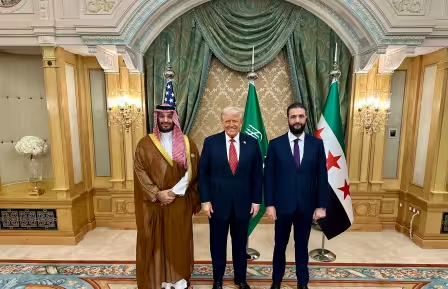
Donald Trump met Syrian leader, once a commander within Al-Qaeda, Ahmed al-Sharaa in Riyadh
In a move that has stunned global observers, Donald Trump met Syrian leader Ahmed al-Sharaa in Riyadh, Saudi Arabia. A possible change in diplomatic ties is indicated by the meeting, which takes place just days after the United States eased sanctions on Syria.
Sharaa, once a commander within Al-Qaeda, led rebel forces that toppled Syrian President Bashar al-Assad in December. His rise to power has been met with skepticism, particularly from Israel and U.S. intelligence agencies, who remain wary of his past affiliations.
The Meeting: A Strategic Shift?
Trump’s decision to meet Sharaa has raised critical geopolitical questions:
- Is the U.S. legitimizing a former jihadist leader?
- What does this mean for Syria’s future relations with the West?
- How will Israel and other Middle Eastern nations react?
The meeting, attended by Saudi Crown Prince Mohammed bin Salman (MbS) and Turkish President Recep Tayyip Erdogan (virtually), suggests a broader regional effort to normalize Syria’s new leadership.
Sharaa’s Past: From Al-Qaeda to Syrian Leadership
Ahmed al-Sharaa was once a high-ranking member of Al-Qaeda’s Syrian affiliate. However, he renounced the group in 2016, distancing himself from extremist ideologies. His leadership in ousting Assad positioned him as a key figure in Syria’s transition.
Despite his break from Al-Qaeda, Israel and U.S. intelligence agencies remain skeptical, citing concerns over his past militant activities.
U.S. Policy Shift: Why Lift Sanctions on Syria?
A significant shift in U.S. policy has occurred with Trump’s decision to remove sanctions on Syria. The move is seen as an attempt to:
- Encourage Syria to normalize ties with Israel
- Open economic opportunities for U.S. businesses in Syria
- Reduce Iranian influence in the region
Saudi Arabia has praised the ruling, claiming that sanctions must be lifted in order for Syria to recover economically.
Israel’s Concerns and Regional Fallout
Israel has expressed strong opposition to the U.S. policy shift, labeling Sharaa a jihadist despite his break from Al-Qaeda. Israeli officials fear that Syria’s new leadership could pose security risks, especially if ties with Iran remain strong.
Trump’s involvement in Syria has been welcomed by Saudi Arabia and Turkey, who see it as a step toward regional stability.
Conclusion – Trump met Syrian leader
Trump’s meeting with Ahmed al-Sharaa in Riyadh marks a pivotal moment in Middle Eastern diplomacy. While some see it as a strategic move toward stability, others fear it legitimizes a controversial figure with a militant past.
As global leaders react, the world watches closely. Will this meeting reshape U.S.-Syria relations, or will it lead to greater regional tensions?
Stay updated with the latest news on Rapido Updates. Keep yourself updated with The World, India News, Entertainment, Market, Gadgets, and many more.